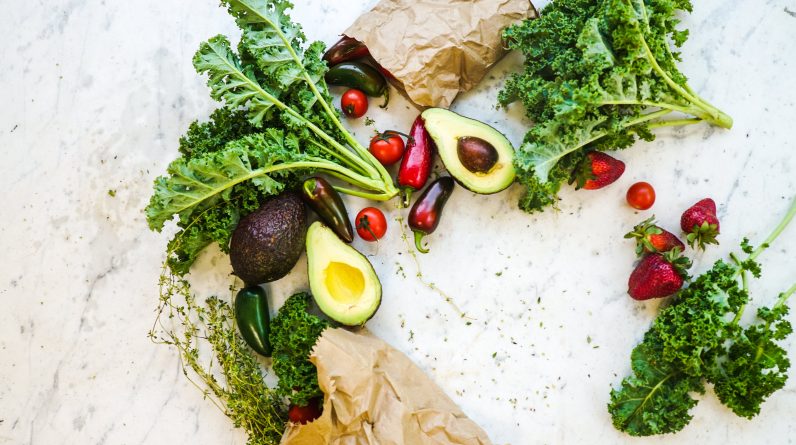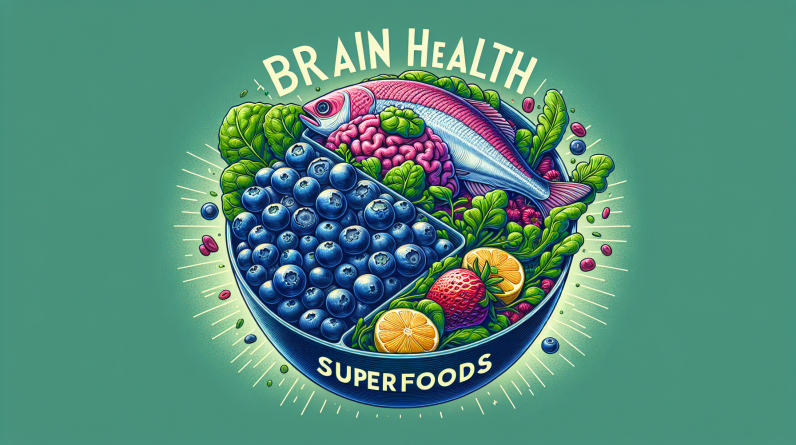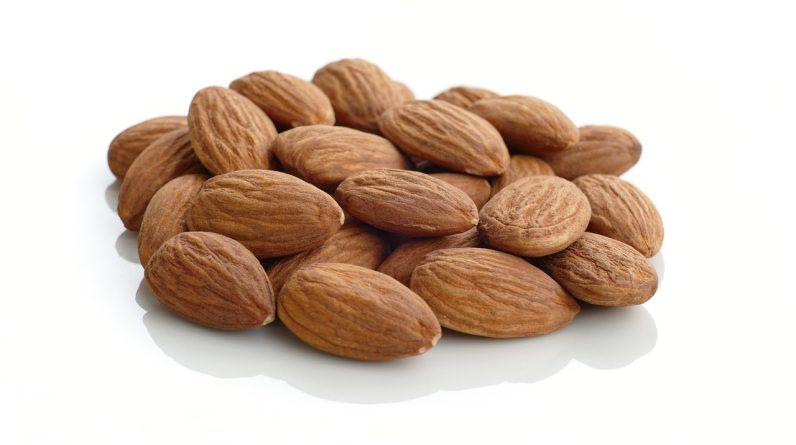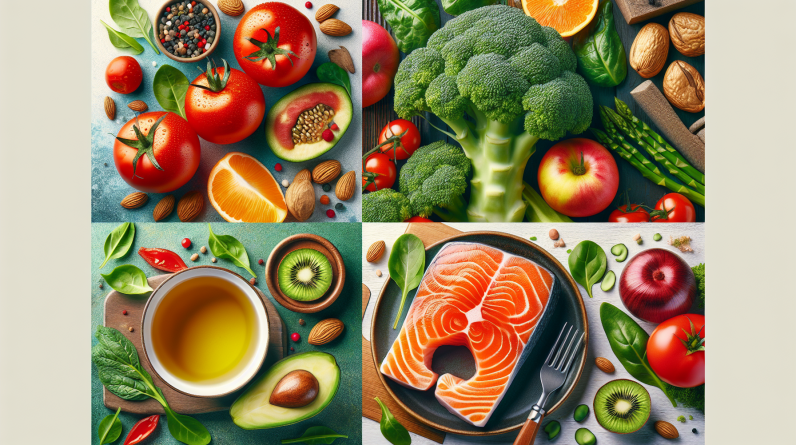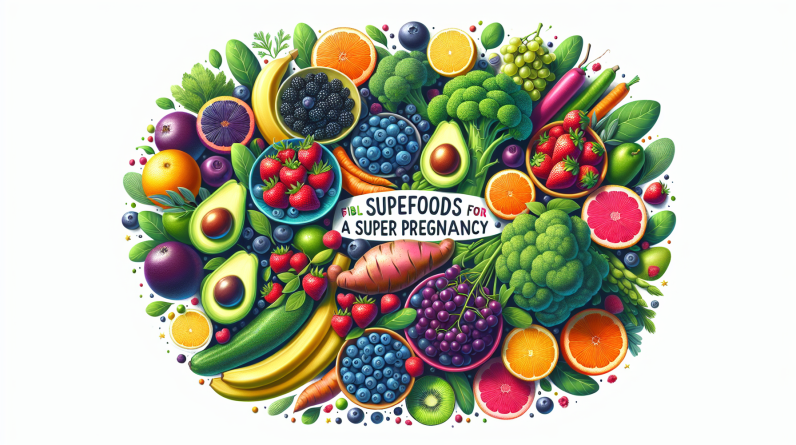
Congratulations on your pregnancy! As you embark on this incredible journey, it’s important to nourish your body and provide it with the right nutrients. In this article, we will explore the power of superfoods and how they can contribute to a healthier and more vibrant pregnancy. Discover the ultimate guide to superfoods that will help you and your baby thrive during this magical time. Get ready to supercharge your pregnancy with these nutrient-packed delights.
Importance of Superfoods During Pregnancy
Pregnancy is a crucial time when your body needs optimal nutrition to support both the growth and development of your baby and to keep you healthy. It is important to meet your nutritional needs during this time to ensure a healthy pregnancy and a strong start for your little one. One way to achieve this is by incorporating superfoods into your diet. Superfoods are nutrient-dense foods that offer an array of health benefits. They are packed with vitamins, minerals, and antioxidants that can help meet your nutritional needs and support the overall well-being of both you and your baby. Let’s dive into the importance of superfoods during pregnancy and how they can positively impact your health.
Nutritional Needs During Pregnancy
During pregnancy, your body undergoes numerous changes as it accommodates the growth of your baby. This puts additional strain on your nutrient requirements and may lead to deficiencies if not properly addressed. Some essential nutrients that you need during pregnancy include folic acid, iron, calcium, omega-3 fatty acids, vitamin D, and protein. These nutrients play a crucial role in the development of your baby’s brain, bones, immune system, and overall growth. By consuming superfoods that are rich in these essential nutrients, you can ensure that you are meeting your nutritional needs throughout your pregnancy.
Benefits of Superfoods
Superfoods offer a wide range of benefits that can support your overall health and well-being during pregnancy. Firstly, they are nutrient-dense, which means they contain high levels of vitamins, minerals, and antioxidants that are essential for your baby’s development. Secondly, superfoods are often packed with fiber, which can aid digestion and prevent constipation – a common issue during pregnancy. Furthermore, many superfoods are low in calories, making them a great choice for managing weight gain during pregnancy. Lastly, superfoods can help boost your immune system, fight inflammation, and reduce the risk of common pregnancy complications such as gestational diabetes and preeclampsia.
Risks of Nutritional Deficiencies
Failing to meet your nutritional needs during pregnancy can have adverse effects on both you and your developing baby. Deficiencies in essential nutrients can lead to a higher risk of birth defects, preterm labor, low birth weight, and impaired cognitive development in your baby. For you, inadequate nutrition can result in excessive fatigue, weak immune system, anemia, and a higher risk of complications during childbirth. By incorporating superfoods into your diet, you can mitigate these risks and ensure that you and your baby receive the necessary nutrients for a healthy pregnancy.
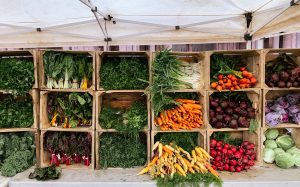
Top Superfoods for a Healthy Pregnancy
Now that we understand the importance of incorporating superfoods into our diet during pregnancy, let’s explore some of the top superfoods that can provide you with essential nutrients and support a healthy pregnancy.
Leafy Green Vegetables
Leafy green vegetables, such as spinach, kale, and broccoli, are powerhouses of nutrition. They are rich in iron, calcium, vitamin C, and folate. Iron helps prevent anemia, while calcium supports the development of your baby’s bones and teeth. Vitamin C enhances iron absorption and folate aids in the formation of your baby’s neural tube.
Berries
Berries, such as strawberries, blueberries, and raspberries, are not only delicious but also packed with antioxidants, fiber, and essential vitamins. They provide vitamin C, folate, and potassium, which are vital for your baby’s growth and development. Additionally, the antioxidants in berries help boost your immune system and reduce the risk of inflammation.
Salmon
Salmon is an excellent source of omega-3 fatty acids, which are crucial for the development of your baby’s brain and eyes. Omega-3 fatty acids also have anti-inflammatory properties and can reduce the risk of preterm labor. Choose wild-caught salmon to avoid the consumption of excessive mercury.
Yogurt
Yogurt is a great source of calcium and protein, essential nutrients for your baby’s bone development and your overall health. Additionally, yogurt contains probiotics, which promote healthy digestion and may reduce the risk of gestational diabetes.
Legumes
Legumes, such as lentils, chickpeas, and black beans, are high in protein, fiber, and other essential nutrients like iron, folate, and potassium. These nutrients are crucial for the development of your baby’s muscles, blood cells, and organs. Legumes are also an excellent vegetarian protein option.
Avocado
Avocados are rich in healthy fats, vitamin K, vitamin C, vitamin E, and B vitamins. The healthy fats in avocados support your baby’s brain development, and the vitamins are essential for a healthy immune system and cell growth.
Eggs
Eggs are an incredible source of high-quality protein, choline, and several essential vitamins and minerals. Choline is important for your baby’s brain development, and protein supports overall growth. Enjoy eggs as a versatile and nutritious addition to your prenatal diet.
Quinoa
Quinoa is a gluten-free grain that is rich in protein, fiber, and essential minerals like iron and magnesium. It provides sustained energy and aids in healthy digestion. Quinoa is an excellent alternative to wheat-based grains and can be incorporated into salads, stir-fries, and side dishes.
Lean Meats
Lean meats, such as chicken, turkey, and lean beef, are excellent sources of high-quality protein, iron, and vitamin B12. Protein is one of the building blocks of your baby’s cells, while iron supports the production of healthy red blood cells.
Chia Seeds
Chia seeds are small but mighty. They are loaded with fiber, omega-3 fatty acids, protein, and various essential minerals. Chia seeds can improve digestion, help regulate blood sugar levels, and provide essential nutrients for your baby’s development.
By incorporating these superfoods into your diet, you can provide yourself and your baby with a wide range of essential nutrients for a healthy pregnancy and optimal development. Remember to consult with your healthcare provider before making any dietary changes during pregnancy.
Ensuring Sufficient Protein Intake
Protein is crucial during pregnancy as it plays a vital role in the development of your baby’s organs, muscles, and tissues. It is also essential for your own health, as it helps maintain the health of your immune system and supports the growth of your breasts and uterus. Let’s take a closer look at why protein is important during pregnancy, sources of pregnancy-friendly protein, and vegetarian and vegan protein options.
Why Protein is Important
Protein is made up of amino acids, which are the building blocks of cells. During pregnancy, your body needs extra protein to support the rapid growth of your baby and the development of their organs and tissues. Protein also plays a crucial role in the production of enzymes, hormones, and antibodies that are necessary for both you and your baby’s health.
Sources of Pregnancy-friendly Protein
There are several protein-rich foods that you can include in your diet to ensure you’re getting sufficient protein during pregnancy. Lean meats such as chicken and turkey provide a good source of protein, while also being low in saturated fat. Additionally, fish and seafood are excellent sources of protein as well as omega-3 fatty acids, which are vital for your baby’s brain development.
If you prefer plant-based options, there are many vegetarian and vegan protein sources available. Legumes, such as lentils, chickpeas, and black beans, are not only high in protein but also contain fiber, iron, and folate. Tofu and tempeh are soy-based products that offer a good amount of protein. Other plant-based protein sources include quinoa, chia seeds, nuts, and seeds.
Vegetarian and Vegan Protein Options
Vegetarian and vegan diets can provide sufficient protein during pregnancy with careful planning. Combining different plant-based protein sources throughout the day can help ensure you’re getting all the essential amino acids your body needs. For example, pairing legumes with whole grains like brown rice or quinoa creates a complete protein source. Using soy products such as tofu or tempeh can also provide a complete protein source. Additionally, incorporating nuts, seeds, and nut butter into your diet can boost your protein intake while adding healthy fats.
To ensure you’re meeting your protein needs during pregnancy, it’s important to consult with your healthcare provider or a registered dietitian who can provide personalized recommendations based on your dietary preferences and needs.
The Power of Iron-rich Foods
Iron plays a critical role in pregnancy as it helps carry oxygen to your tissues and supports the growth and development of your baby. During pregnancy, your body requires more iron to accommodate the increase in blood volume and to provide proper oxygenation. Let’s explore the role of iron in pregnancy, the best iron-rich superfoods, and how to enhance iron absorption.
Role of Iron in Pregnancy
Iron is an essential mineral that is responsible for producing hemoglobin, a protein found in red blood cells that carries oxygen throughout the body. During pregnancy, your iron requirements increase significantly to support the production of extra red blood cells needed to supply oxygen to both you and your baby. Iron also aids in the development of your baby’s brain, provides energy, and supports the immune system.
Best Iron-rich Superfoods
Including iron-rich superfoods in your diet can help you meet your increased iron requirements during pregnancy. Some of the best sources of iron include leafy green vegetables, such as spinach and kale, as well as legumes, such as lentils and chickpeas. These plant-based sources of iron also provide additional nutrients like folate, fiber, and protein.
Lean meats, such as beef, chicken, and turkey, are also excellent sources of iron. Combining lean meats with foods rich in vitamin C, such as citrus fruits or bell peppers, can enhance iron absorption. Additionally, fortified cereals, whole grains, and dried fruits like raisins and apricots can contribute to your iron intake.
Enhancing Iron Absorption
While incorporating iron-rich superfoods into your diet is important, there are also strategies you can implement to enhance iron absorption. Consuming foods high in vitamin C in combination with iron-rich foods can significantly increase the absorption of iron. For example, squeezing lemon juice on your spinach salad or enjoying a glass of orange juice with your lentil curry can maximize iron absorption.
On the other hand, certain foods and beverages can hinder iron absorption. Avoid consuming calcium-rich foods or beverages, such as dairy products, at the same time as iron-rich foods, as calcium can inhibit iron absorption. Similarly, tannins found in tea and coffee can interfere with iron absorption, so it’s best to consume these beverages separately from meals.
It’s worth noting that some pregnant women may require iron supplements to meet their increased needs. Your healthcare provider can determine if iron supplementation is necessary based on your individual iron levels and dietary intake.
Vitamin C for Enhanced Absorption
Vitamin C is a crucial nutrient during pregnancy as it plays a vital role in the absorption of iron and supports the immune system. Including vitamin C-rich foods in your diet can help enhance the absorption of iron from plant-based sources and ensure you’re meeting your daily vitamin C requirements. Let’s explore the importance of vitamin C in pregnancy, superfoods high in vitamin C, and how to pair iron-rich foods with vitamin C.
Importance of Vitamin C in Pregnancy
Vitamin C is a powerful antioxidant that supports your immune system, promotes wound healing, and aids in the formation of collagen – a protein found in your baby’s skin, bones, and connective tissues. Additionally, vitamin C enhances the absorption of iron from plant-based sources, which is especially important for vegetarians and vegans who rely on non-heme iron.
Superfoods High in Vitamin C
There are numerous superfoods that are packed with vitamin C and can be easily incorporated into your pregnancy diet. Citrus fruits, such as oranges, grapefruits, and lemons, are excellent sources of vitamin C. Other fruits like strawberries, kiwis, and mangoes also provide a good amount of this important nutrient.
In addition to fruits, several vegetables are high in vitamin C. Bell peppers, broccoli, Brussels sprouts, and cauliflower all contain significant amounts of vitamin C. Leafy green vegetables, especially spinach and kale, not only provide iron but also vitamin C, making them a nutrient-dense choice for pregnancy.
Pairing Iron-rich Foods with Vitamin C
Pairing iron-rich foods with vitamin C-rich foods can significantly enhance iron absorption, especially for non-heme iron found in plant-based sources. For example, adding slices of orange or lemon juice to your leafy green salad or enjoying a glass of freshly squeezed orange juice with your lentil curry can improve iron absorption.
Similarly, combining vitamin C-rich fruits like strawberries or kiwis with iron-fortified cereals can boost the absorption of iron. Be mindful of avoiding calcium-rich foods or beverages at the same time as vitamin C-rich foods, as calcium can inhibit iron absorption.
By consciously pairing iron-rich foods with vitamin C, you can optimize iron absorption and ensure that you’re getting the most out of the nutrient-rich foods you consume during pregnancy.
Omega-3 Fatty Acids for Brain Development
Omega-3 fatty acids are essential for both you and your baby during pregnancy. They play a critical role in the development of your baby’s brain and eyes and have a range of other health benefits. Let’s explore why omega-3 fatty acids are essential, sources of omega-3 fatty acids, and how to choose safe seafood options.
Why Omega-3 Fatty Acids are Essential
Omega-3 fatty acids, particularly docosahexaenoic acid (DHA), are crucial for the development of your baby’s brain and eyes. DHA is a major component of the cerebral cortex and the retina of the eyes, where it influences the growth and function of these vital organs. Additionally, omega-3 fatty acids have anti-inflammatory properties, support heart health, and may reduce the risk of preterm labor.
Sources of Omega-3 Fatty Acids
Fatty fish are the best natural source of omega-3 fatty acids, especially DHA and eicosapentaenoic acid (EPA). Salmon, sardines, trout, and mackerel are all excellent choices for obtaining omega-3 fatty acids from seafood. However, it is important to choose safe seafood options to avoid excessive mercury intake.
If you prefer plant-based options, flaxseeds, chia seeds, walnuts, and hemp seeds are rich in another type of omega-3 fatty acid called alpha-linolenic acid (ALA). While ALA is not as readily converted to DHA and EPA as the omega-3s found in fish, including these plant-based sources in your diet can still provide health benefits.
Choosing Safe Seafood Options
When consuming fish during pregnancy, it is crucial to choose low-mercury options. Some fish, such as shark, swordfish, king mackerel, and tilefish, are known to have higher levels of mercury, which can be harmful to your baby’s developing nervous system. Instead, opt for fish with lower levels of mercury, such as salmon, canned light tuna, shrimp, and catfish.
It’s important to note that some healthcare providers may recommend avoiding certain types of fish altogether during pregnancy due to their higher mercury content. Consult with your healthcare provider to determine which fish are safe for you to consume based on your individual circumstances.
By incorporating omega-3 fatty acids into your diet, either through fish or plant-based sources, you can support your baby’s brain development and enjoy the additional health benefits that omega-3s provide.
Calcium and Vitamin D for Strong Bones
Calcium and vitamin D are essential nutrients for both you and your baby during pregnancy. They play a crucial role in the development of strong bones and teeth, as well as supporting various other functions in the body. Let’s explore the role of calcium and vitamin D, dairy and non-dairy calcium sources, and how to ensure you’re getting sufficient vitamin D.
The Role of Calcium and Vitamin D
Calcium is vital for your baby’s bone and teeth development, as well as their heart, muscles, and nerves. If you don’t consume enough calcium during pregnancy, your baby will draw calcium from your bones, increasing the risk of osteoporosis later in life.
Vitamin D is essential for the absorption of calcium and helps regulate the levels of phosphorous in your body. It also supports the growth and development of your baby’s bones and teeth. Without sufficient vitamin D, your body can’t absorb the calcium it needs, even if your diet is rich in calcium.
Dairy and Non-dairy Calcium Sources
Dairy products are excellent sources of calcium and should be included in your diet if you tolerate them well. Milk, cheese, and yogurt all provide calcium and are often fortified with vitamin D.
If you’re lactose intolerant or follow a dairy-free diet, there are plenty of non-dairy sources of calcium available. Leafy green vegetables such as spinach, kale, and broccoli are high in calcium. Fortified plant-based milk alternatives, like almond, soy, or oat milk, can also provide calcium and vitamin D. Additionally, tofu, tempeh, and certain types of fish, such as sardines with bones, are good sources of calcium.
Getting Sufficient Vitamin D
While some food sources contain small amounts of vitamin D, it is challenging to obtain sufficient amounts through diet alone. The main source of vitamin D is sunlight. When your skin is exposed to sunlight, it can synthesize vitamin D naturally. However, many factors, such as geographical location, time of year, and skin pigmentation, can affect the amount of vitamin D your body produces.
If you have limited sun exposure or live in a region with minimal sunlight, it’s important to ensure you’re getting enough vitamin D from other sources. Your healthcare provider may recommend vitamin D supplementation during pregnancy to ensure adequate levels.
Taking calcium and vitamin D together helps optimize calcium absorption. If you’re taking a calcium supplement, make sure it also contains vitamin D or speak to your healthcare provider about whether you should take a separate vitamin D supplement.
By including calcium-rich foods in your diet and ensuring you have adequate vitamin D intake, you can support the development of strong bones and teeth for both you and your baby.
Fiber for Digestive Health
Fiber plays an important role in maintaining digestive health, preventing constipation, and ensuring overall well-being during pregnancy. Let’s explore the benefits of fiber during pregnancy, superfoods high in fiber, and ways to prevent and relieve constipation.
Benefits of Fiber During Pregnancy
Adequate fiber intake is essential during pregnancy to support digestive health. Fiber helps promote regular bowel movements, prevent constipation, and reduce the risk of hemorrhoids, which are common discomforts experienced during pregnancy. Additionally, fiber contributes to a feeling of fullness, which can help manage weight gain during pregnancy.
Superfoods High in Fiber
Including fiber-rich superfoods in your prenatal diet can help you meet your fiber needs and support optimal digestive health. Legumes, such as lentils, chickpeas, and black beans, are excellent sources of both soluble and insoluble fiber. Leafy green vegetables like spinach and kale are also packed with fiber, as well as essential nutrients.
Whole grains, such as oats, whole wheat bread, and brown rice, are not only high in fiber but also provide sustained energy throughout the day. Fruits like apples, pears, and berries are delicious and nutritious sources of fiber.
Preventing and Relieving Constipation
During pregnancy, hormonal changes can lead to slowed digestion and increased water absorption, often resulting in constipation. However, there are several strategies you can implement to prevent and relieve constipation.
Firstly, ensure you’re staying well-hydrated by drinking plenty of water throughout the day.
Secondly, increase your fiber intake gradually and make sure to consume a variety of fiber-rich foods. This will help soften stools and promote regular bowel movements. Aim for at least 25-35 grams of fiber per day.
Thirdly, engage in regular physical activity, such as gentle exercises or walking, as this can help stimulate bowel movements.
Lastly, if you’re experiencing persistent constipation, speak to your healthcare provider about safe and appropriate remedies or supplements that can help regulate your digestion.
By incorporating fiber-rich superfoods into your diet and adopting healthy habits, you can promote regular bowel movements and maintain optimal digestive health during pregnancy.
Antioxidant-rich Foods for a Strong Immune System
Antioxidants play a crucial role in supporting a strong immune system, protecting against cellular damage, and reducing the risk of certain diseases. During pregnancy, it’s important to consume antioxidant-rich foods to support your own health as well as the development of your baby. Let’s delve into the importance of antioxidants in pregnancy, superfoods packed with antioxidants, and ways to boost immunity for both you and your baby.
Importance of Antioxidants in Pregnancy
Antioxidants are compounds that help neutralize harmful molecules called free radicals, which can damage cells and contribute to various health conditions. During pregnancy, the increased metabolic demands and changes in hormone levels can increase oxidative stress, making antioxidants even more important.
Consuming antioxidant-rich foods can boost your immune system, support healthy cell development, and reduce the risk of chronic diseases and pregnancy complications such as preeclampsia.
Superfoods Packed with Antioxidants
The superfoods listed below are rich in antioxidants and can be easily incorporated into your pregnancy diet:
- Berries, such as blueberries, strawberries, and raspberries, are packed with antioxidants called anthocyanins, which give them their vibrant color.
- Dark chocolate contains flavonoids, a type of antioxidant. Choose dark chocolate with a high cocoa content for maximum benefits.
- Tomatoes are rich in lycopene, an antioxidant that gives them their red color. Cooking tomatoes actually enhances the absorption of lycopene.
- Nuts and seeds, such as almonds, walnuts, chia seeds, and flaxseeds, are abundant in antioxidants, healthy fats, and other essential nutrients.
- Green tea is a refreshing beverage that contains catechins, powerful antioxidants that can boost your immune system.
Boosting Immunity for Both Mother and Baby
In addition to consuming antioxidant-rich foods, adopting healthy lifestyle habits can further support a strong immune system during pregnancy. Getting enough sleep, managing stress levels, and engaging in regular physical activity, as approved by your healthcare provider, can all boost your immune system.
It’s also important to practice good hygiene, such as washing your hands regularly, avoiding close contact with sick individuals, and getting vaccinated against certain diseases as recommended by your healthcare provider.
By incorporating antioxidant-rich superfoods and adopting healthy lifestyle habits, you can support a strong immune system for both you and your baby, promoting overall well-being during pregnancy.
Hydration and Electrolyte Balance
Staying hydrated and maintaining electrolyte balance are essential for a healthy pregnancy. Water is the primary component of your cells and supports various bodily functions. During pregnancy, your body requires additional fluids to support the growth and development of your baby. Let’s explore the importance of staying hydrated, balancing electrolytes, and some healthy hydration options.
The Importance of Staying Hydrated
Staying hydrated is crucial during pregnancy as water plays a vital role in maintaining overall health. It helps regulate body temperature, supports digestion and nutrient absorption, flushes out waste products, and lubricates joints. Water is also essential for the proper functioning of your kidneys, which filter waste from your blood and create urine.
During pregnancy, your blood volume increases, and your body needs more fluids to support the growth of your baby and ensure proper circulation. Dehydration can lead to complications such as constipation, urinary tract infections, and even preterm labor. It’s important to listen to your body’s thirst cues and drink enough fluids throughout the day.
Balancing Electrolytes
Electrolytes are minerals that carry an electric charge and help maintain fluid balance, nerve function, and muscle contraction. The main electrolytes in your body include sodium, potassium, calcium, and magnesium. Balancing electrolytes is crucial for proper bodily function, and maintaining the right levels can help prevent muscle cramps, fatigue, and dehydration.
Eating a balanced diet that includes a variety of fruits, vegetables, whole grains, lean proteins, and dairy or non-dairy alternatives can help ensure you’re getting an adequate supply of electrolytes. Additionally, consuming foods high in potassium, such as bananas, oranges, and avocados, can help replenish electrolytes naturally.
Healthy Hydration Options
Water is the best choice for staying hydrated during pregnancy. Aim for at least 8-10 cups (64-80 ounces) of water per day, depending on your overall fluid needs and activity level. If you find it challenging to drink plain water, you can infuse it with slices of fresh fruit or herbs for a refreshing twist.
Herbal teas can also contribute to your fluid intake, but it’s important to choose pregnancy-safe options. Some herbal teas, such as peppermint or ginger tea, can help alleviate common pregnancy discomforts like nausea and indigestion. However, it’s best to avoid herbal teas like chamomile, which may have sedative effects.
Avoid excessive consumption of sugary beverages, caffeinated drinks, and alcohol, as these can lead to dehydration and may pose risks to your baby’s development.
By prioritizing hydration and maintaining electrolyte balance through a balanced diet and healthy hydration choices, you can support a healthy pregnancy and ensure the well-being of both you and your baby.
Incorporating superfoods into your pregnancy diet provides a wide array of benefits for both you and your growing baby. From meeting your nutritional needs to supporting optimal development and reducing the risk of complications, these nutrient-dense foods can play a significant role in your overall health during pregnancy. By following this comprehensive guide and consulting with your healthcare provider, you can create a super pregnancy by nourishing your body with the right foods and ensuring a strong start for your little one. Cheers to a healthy and happy pregnancy!



